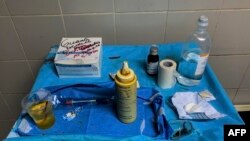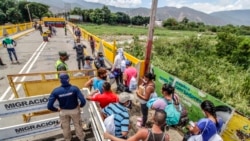On February 28, Venezuelan President, Nicolas Maduro shared a video via Twitter to mark the one-year anniversary of the Presidential Commission on Prevention and Fighting COVID-19. He boasted: "[W]ith certainty ... we have built a method to serve our people and protect their lives."
The three-minute video listed the government’s achievements fighting COVID-19, including a "preventive campaign," preparing "58 hospitals and 400 integral diagnostic centers, distributed all around the country," and hospitalizing all COVID-19 cases.
These claims are misleading and far from the reality of COVID-19 in Venezuela.
Since the pandemic hit last year, experts and international organizations have watched Venezuela warily, given its crippled healthcare system. Last May, Human Rights Watch and Johns Hopkins University questioned Venezuela’s official count of COVID-19 cases and deaths in the country, saying they were "likely false” and that the real numbers “could in fact be thousands of times higher than official figures," AFP reported.
Amid Venezuela’s nearly decade-long political and economic turmoil, the country’s healthcare system has severely deteriorated. The Pan American Health Organization (PAHO) reported in 2018 that 22,000 of Venezuela’s 66,138 doctors (one-third of registered physicians) had left the country as of 2014, the year after Maduro became president.
In a survey by the nonprofit Venezuelan Observatory of Public Services (OVSP) last June, 60 percent of respondents indicated they lacked quality services to adequately deal with a quarantine. Nearly 65 percent said they lacked enough water to maintain hygiene practices, and 62 percent said they lacked internet capacity to work remotely or attend school.
As Polygraph.info previously reported, in August 2020, Maduro published a video of someone from a pro-government group praising the COVID-19 care she received at Dr. Egor Nucete Hospital. But two days later, members of that hospital’s nursing staff launched a sit-down strike over the lack of biosafety equipment, supplies and “decent and optimal working conditions.”
Last June, 20 people infected with the virus asked to be released from the University Hospital of Maracaibo because they had no food or water. The state's doctors’ association decried the lack of hospital beds and supplies, the use of low-budget hotels to quarantine coronavirus patients and the underuse of face masks.
Alianza Rebelde Investiga (ARI), a Venezuelan news media collaborative, reported last year that "hospital equipment, medical personnel and provision of basic services” were “insufficient” at the country’s 47 hospitals designated to treat coronavirus patients.
Only about half of the hospitals had a continuous water supply, and 2 in 5 had insufficient or no protective gear – such as gowns, surgical and face masks – for doctors and nurses. The investigation also found that only 15 ambulances were in operation for the entire hospital network.
Former Venezuelan health minister Rafael Orihuela told the Voice of America in August that the country does not have enough labs for COVID-19 testing, even though more could be built – and were promised. “It seems that there is an attempt not to do so in order to keep [the figures] murky,” he said.
Throughout 2020, media reports said the government deployed security forces and quarantined those who tested positive in warehouses. The New York Times reported last August that Venezuelans returning to the country because of the pandemic – called “bioterrorists" by Maduro – were being placed in crowded rooms with limited protection, food and water, and "held under military guard for weeks or months for coronavirus tests or treatment with unproven medications.”
The same month, Bloomberg reported that patients and doctors were avoiding tests so they couldn’t be sent to state-run quarantine centers.
“Venezuela was already very short on medical staff. People are afraid. Now patients arrive immediately needing intensive care because they lived with the disease at home until they just couldn’t any longer,” Maria Graciela Lopez, head of Venezuela’s Society of Infectology, told the news agency.
Bloomberg reported that some people were relying on black market testing to evade government monitoring.
Last June, Maduro’s government and the opposition-led National Assembly, along with PAHO, signed an agreement to work together to respond to the coronavirus outbreak. They also committed to creating official channels for PAHO to assist with diagnostic capacity, protect health workers, respond to confirmed cases and increase surveillance.
In January, the opposition accused Maduro's government of violating the agreement by transferring PAHO-supplied medication and equipment to the government’s own network of regional laboratories and centers, according to Reuters.
Miguel Pizarro, a United Nations representative appointed by Venezuelan opposition leader Juan Guaido, said in a statement that the government's move gave it "absolute control" over the country's COVID-19 data and test results, Reuters wrote.
Officially, Venezuela has recorded nearly 140,000 coronavirus cases and more than 1,300 deaths. However, those statistics remain disputed.

